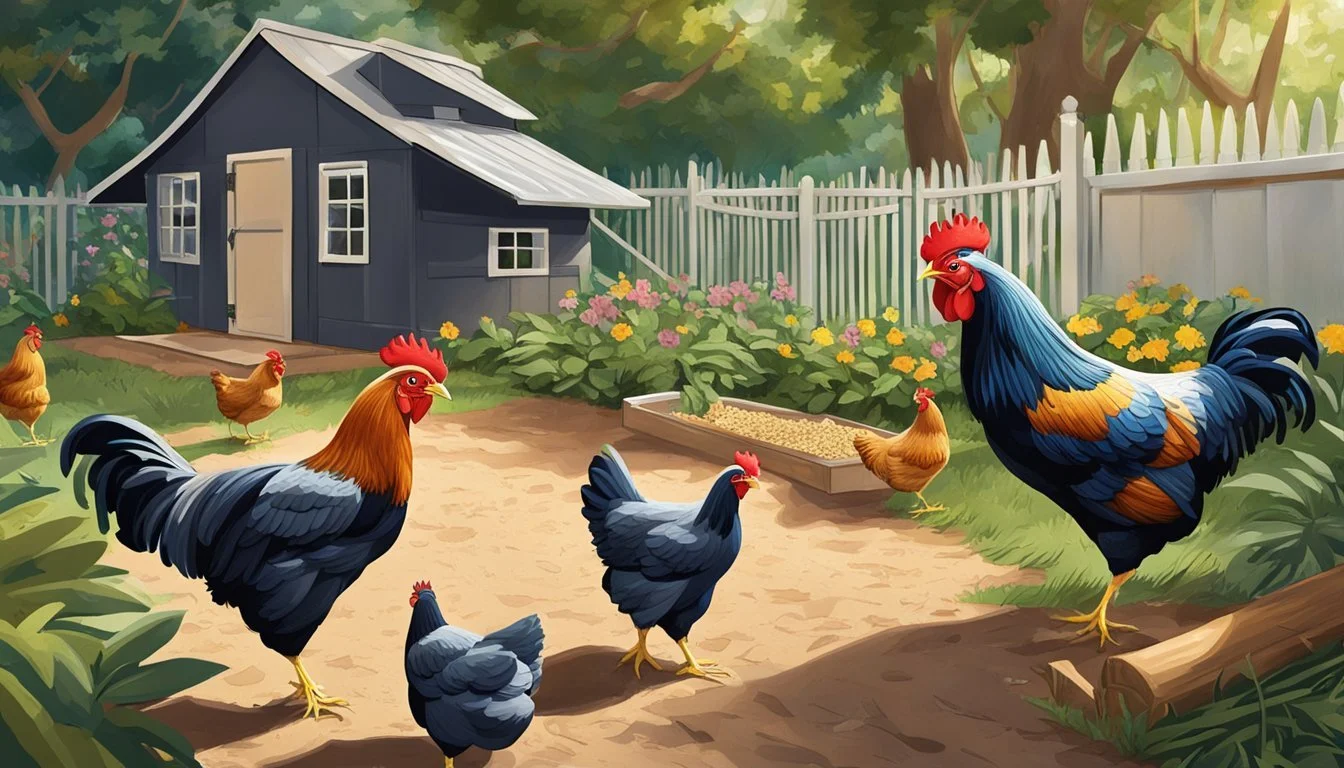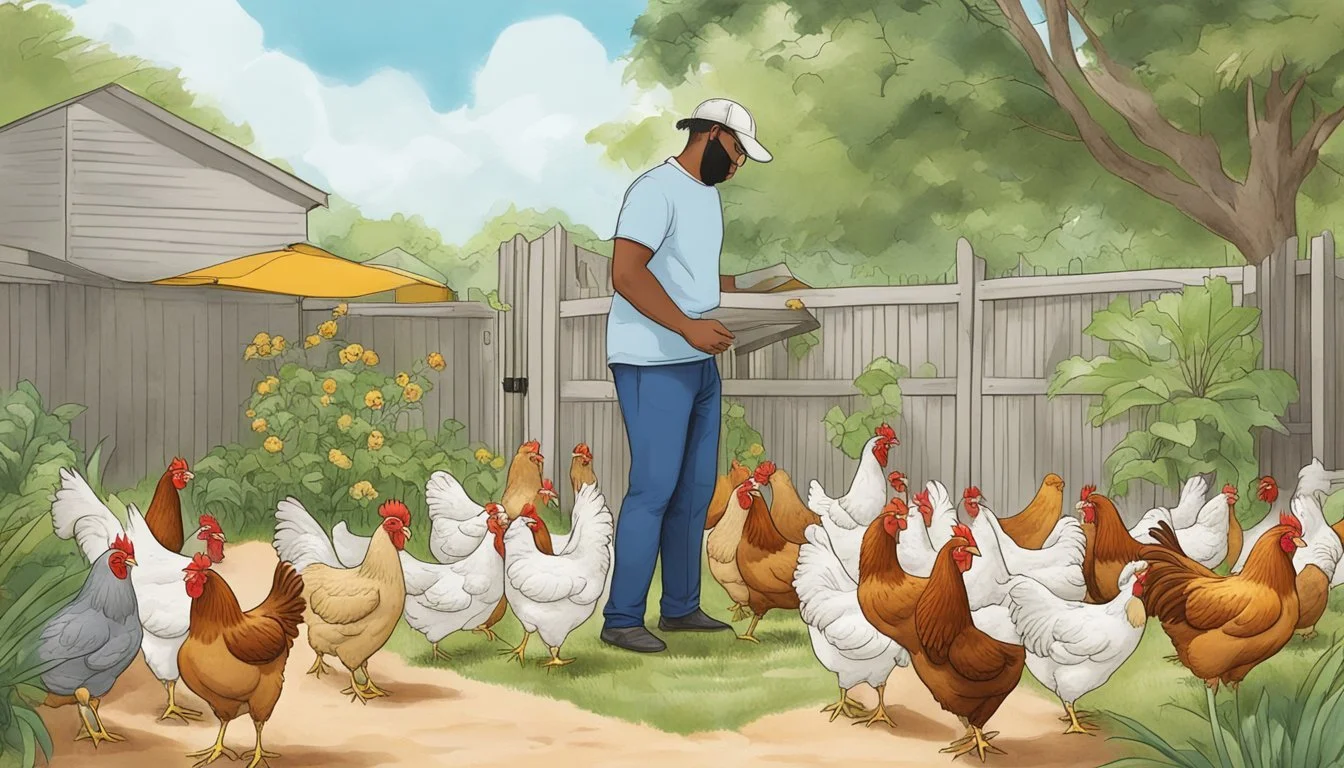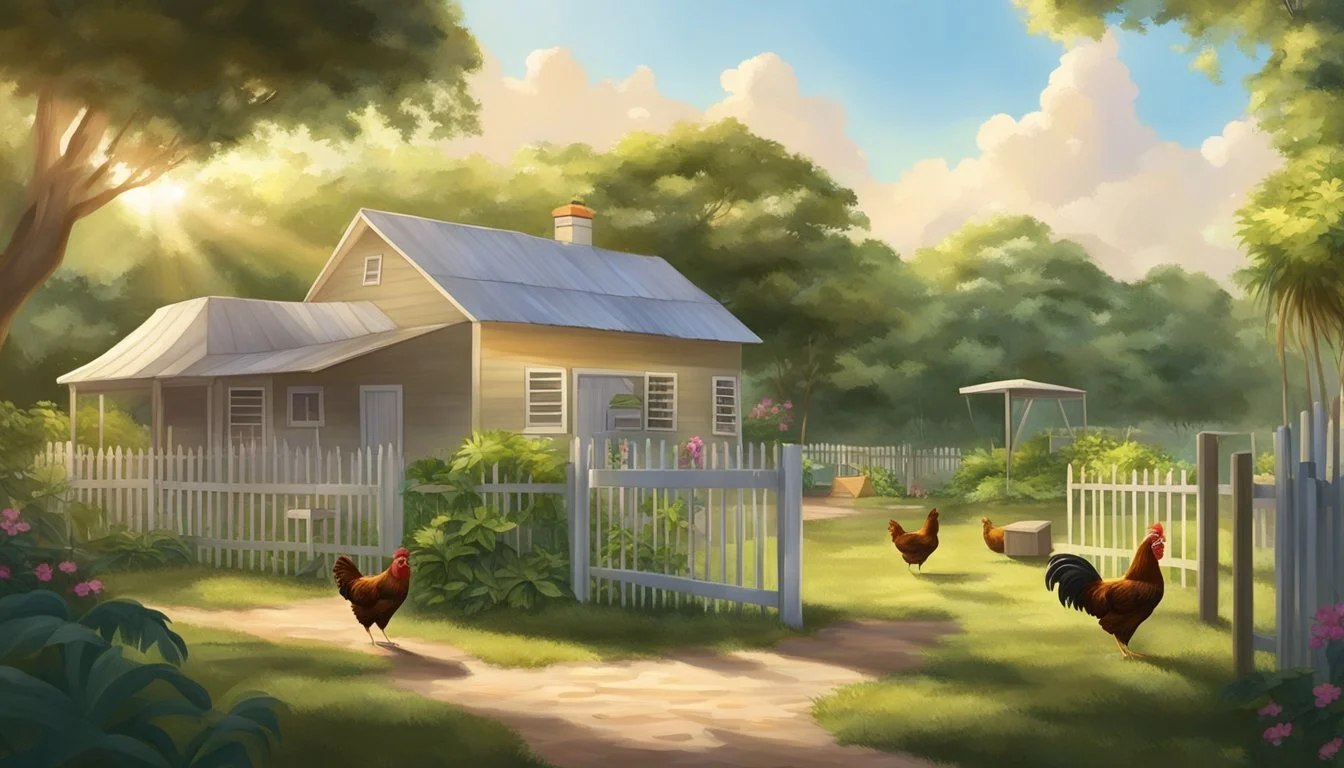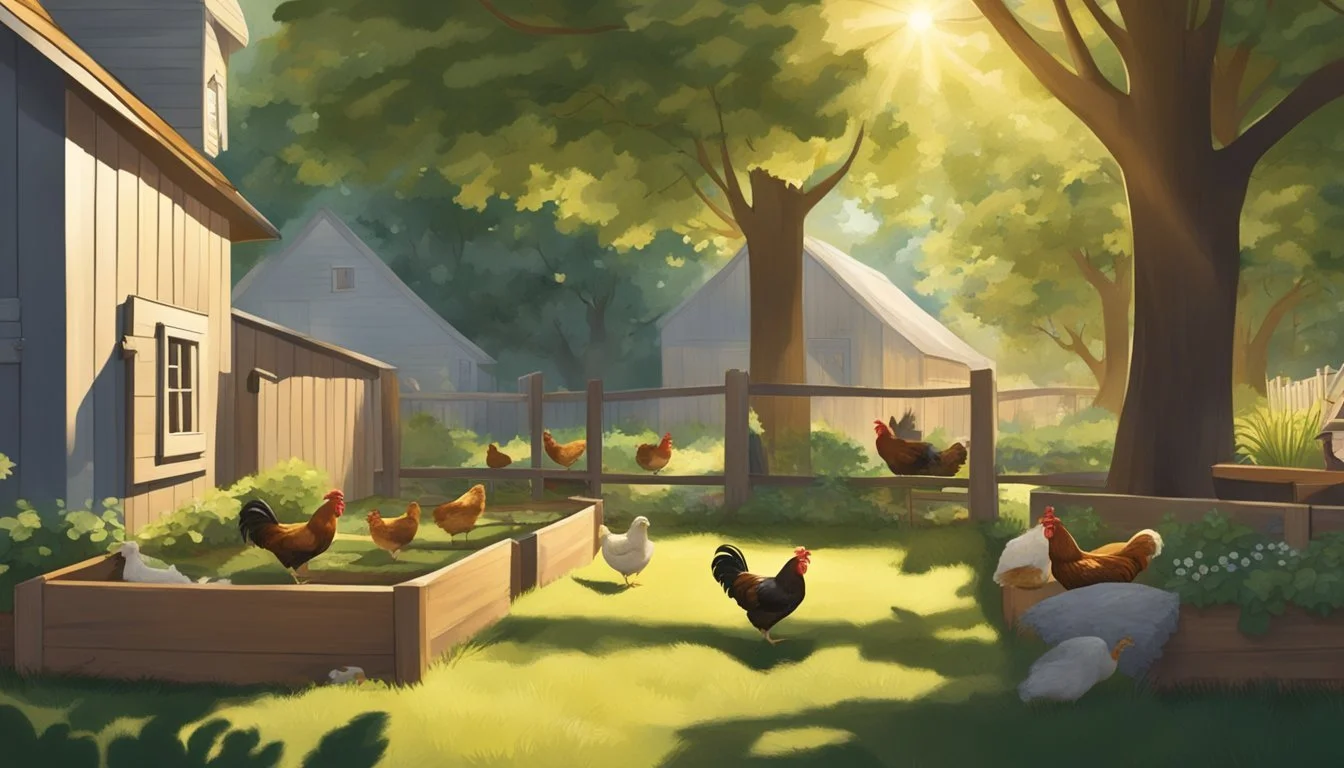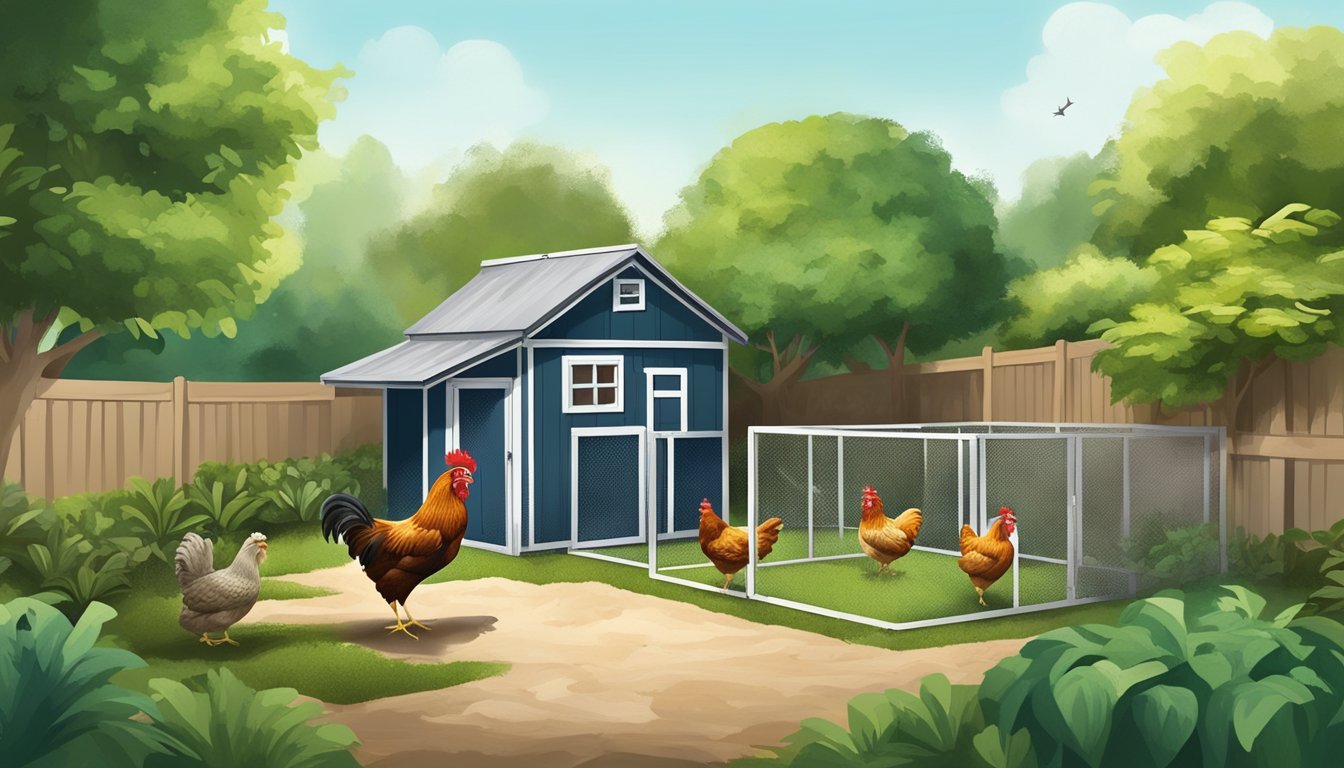Raising Backyard Chickens in Plantation, FL
Your Essential Guide
Raising backyard chickens has become a popular endeavor for residents in Plantation, Florida, echoing a nationwide trend towards sustainable living and locally-sourced food. As urban and suburban households take a keen interest in agricultural hobbies, understanding the local ordinances is crucial to successfully raising chickens without legal hiccups. In Plantation, regulations are in place to ensure that this practice is managed responsibly, balancing the interests of chicken enthusiasts with those of the wider community.
Under the city's specific guidelines, Plantation homeowners are allowed to keep chickens on their property, subject to certain conditions. The local ordinance stipulates that individuals can house one chicken per 1,000 square feet of their lot, with a maximum of five chickens permitted overall. This ensures that the birds have adequate space and that the coops do not cause overcrowding or sanitation issues.
Moreover, the presence of a chicken coop is mandatory for those interested in raising chickens, and these coops must comply with the zoning district's accessory structure setbacks. With a maximum allowable size for chicken coops capped at 125 square feet, Plantation's ordinances demonstrate a commitment to maintaining neighborhood aesthetics and minimizing potential disputes among residents. This framework lays a clear and straightforward path for potential chicken owners to follow, promoting harmony between human and animal neighbors within the community.
Legal Considerations for Keeping Chickens
When considering raising backyard chickens in Plantation, Florida, it is crucial to understand the local legal framework, which includes specific zoning laws, permit requirements, and restrictions. Below is a comprehensive guide to navigating these regulations.
Understanding Zoning and City Ordinances
In Plantation, FL, the zoning regulations dictate that chickens are permissible within certain residential areas. Homeowners should verify the specific zoning district of their property to determine the exact requirements, as these can differ from one locality to another. For instance, while chicken ownership may be allowed in areas like Plantation, other Florida cities such as Miami, Tampa, and Orlando each have their unique set of rules that residents must adhere to.
Permit Requirements and Restrictions
Permits are a fundamental aspect of legal chicken ownership. Prospective chicken keepers in Plantation must acquire the appropriate permits before setting up their coops. The permitting process might vary among different regions in Florida; for example, cities like Fort Lauderdale, Sarasota, or Jacksonville might have different permit requirements or application processes compared to Plantation.
Plantation: Obtain a permit through the city's local government.
Other areas: Check with the local agricultural extension office or city hall for details.
Limits on the Number of Chickens and Rooster Regulations
Plantation's local ordinance stipulates specific limitations on the number of chickens a resident can keep:
Maximum Number: No more than five chickens are permitted.
Lot Size: One chicken per 1,000 square feet of parcel area.
Roosters: While the search results do not specify, typically, roosters are prohibited or regulated in urban settings due to noise concerns.
Cities throughout Florida, including Gainesville, West Palm Beach, and Fort Myers, may have different limits and regulations about the number of chickens and the keeping of roosters.
Note: Always confirm with Plantation's local city ordinances for the most current regulations related to chicken ownership.
Selecting the Right Chicken Breed
When raising backyard chickens in Plantation, FL, it is essential to consider breeds that thrive in the state's unique climate while also meeting egg or meat production goals. Each chicken breed has distinctive characteristics that make it well-suited to certain environments and purposes.
Climate Adaptability for Florida's Weather
Florida's weather is characterized by heat and humidity. Choosing breeds that are heat-tolerant and can withstand these conditions is crucial. Rhode Island Reds are an excellent choice, known for their robustness in various climates, including warm areas like Florida. They have good egg-laying capabilities, averaging 250-300 eggs annually. Leghorns are another suitable breed; they are lightweight, which makes them less prone to overheating, and are prolific egg layers.
Breed Recommendations:
Rhode Island Red: Brown eggs, heat-resistant
Leghorn: White eggs, heat-tolerant
Purpose: Eggs, Meat, or Both?
Deciding whether the chickens are raised for eggs, meat, or both is a key factor. For egg production, Leghorns are standout layers with impressive figures of over 300 eggs per year. If meat production is the primary goal, larger breeds that mature quickly would be a better fit. For dual-purpose breeds that offer both egg-laying and meat production, the Rhode Island Red serves well, providing a steady supply of eggs and a decent amount of meat.
Breed Purpose:
Leghorns: Egg production
Rhode Island Red: Dual-purpose
Temperament and Space Requirements
A chicken's temperament can affect its space needs and how it interacts with the flock. Rhode Island Reds are known for being relatively easy to manage and friendly. They are adaptable to confinement but also benefit from room to forage. Leghorns are more active and do prefer to have more space. It is important to provide a clean and spacious environment, regardless of the breed, to ensure good health and egg production.
Space and Temperament:
Rhode Island Red: Friendly, adaptable to space
Leghorn: Active, prefers more space
Before selecting a breed, one must assess these factors inline with their climate, purpose for raising chickens, and available space. Each breed brings its unique qualities to the backyard flock of Plantation, FL.
Setting Up Your Coop
When establishing a chicken coop in Plantation, FL, residents must ensure that their structures not only comply with local zoning regulations but also meet the spatial, environmental, and safety needs of their chickens.
Sizing and Security against Predators
A chicken coop should provide ample space for chickens to move freely, with 1,000 square feet of lot area per chicken and an upper limit of 5 chickens allowed. The coop itself must not exceed 125 square feet. To protect against local predators, such as raccoons, snakes, and birds of prey, the coop must be securely enclosed with durable materials. The use of hardware cloth over windows and beneath the coop can prevent predators from gaining access.
Proper Ventilation and Weather Considerations
A well-ventilated coop is crucial for the health of the chickens, especially in Florida's humid climate. Incorporate vents or windows that allow for air circulation while keeping rain out. The coop should be positioned to avoid direct exposure to harsh weather, providing a dry shelter during rainfall. Overhangs or slanted roofs can ensure rainwater runs away from the coop, preventing moisture accumulation that can lead to diseases.
Nesting Boxes and Maintenance
Each coop requires nesting boxes where hens can lay eggs. Allocate at least one box for every three to four hens and fill them with clean, soft bedding such as straw or wood shavings. For ease of maintenance, place the boxes at a height that allows for convenient access and cleaning. Regular cleaning of the coop and nesting boxes will prevent the build-up of droppings and reduce the risk of disease.
Chicken Care and Maintenance
Raising backyard chickens in Plantation, FL requires diligent care and maintenance to ensure the health and productivity of the flock. Proper feeding, cleanliness, and management practices are essential for yielding fresh eggs and maintaining a clean environment.
Daily Feeding and Access to Fresh Water
Chickens need a consistent supply of nutritionally balanced chicken feed to stay healthy. For chicks aged 0-8 weeks, 18-20% starter feed crumbles are recommended, transitioning to 16-18% starter/grower until they reach 14 weeks. Adult chickens thrive on a 16% layer feed. Access to fresh water is crucial; waterers must be kept clean and filled to prevent disease.
Chick Starter: 0-8 weeks, 18-20% protein
Grower Feed: 8-14 weeks, 16-18% protein
Layer Feed: 15+ weeks, 16% protein
Cleanliness and Disease Prevention
Sanitation is paramount to prevent diseases. Regular cleaning of the coop and accessories, like chicken feeders, minimizes health risks. Implementing biosecurity measures, such as restricting access to the coop, aids in disease prevention. A chicken coop in Plantation, FL should be no more than 125 square feet and adhere to zoning district setbacks for safety and cleanliness.
Coop Cleaning: Use safe, disinfectant products without harming the chickens.
Biosecurity: Control access and quarantine new birds.
Egg Collection and Brooder Management
Collecting eggs daily ensures they are clean and edible. Proper brooder management is vital, especially in Florida, where chicks require 2-3 square feet of space each and temperatures starting at 90°F, decreasing weekly by 5°F until reaching 55°F. This controlled environment promotes healthy development during the crucial first weeks.
Egg Collection: Daily, to maintain egg freshness and deter predators.
Brooder Temperature: Start at 90°F, decrease by 5°F weekly.
By following these specific care and maintenance guidelines, owners can successfully raise chickens in Plantation, FL, to enjoy the benefits of fresh eggs and a rewarding backyard flock.
Health and Well-being
In the context of raising backyard chickens in Plantation, FL, maintaining the health and well-being of the flock is paramount. A combination of vigilant observation for signs of illness, robust biosecurity measures, and consistent preventative care lays the foundation for a thriving flock.
Signs of Common Illnesses
Chickens can fall prey to a variety of diseases, many of which manifest through noticeable symptoms. Owners should be aware of these signs, which may include but are not limited to:
Respiratory Issues: Labored breathing, coughing, sneezing, and nasal discharge.
Digestive Problems: Changes in droppings, such as diarrhea or abnormal colors.
Behavioral Changes: Lethargy, loss of appetite, decreased egg production, or abnormal posture.
Physical Abnormalities: Swelling, blemishes on the skin, feather loss, or parasites.
By recognizing these early signs, chicken owners can take swift actions to address health problems, thereby reducing the spread of disease within the flock.
Routine Health Checks and Preventative Care
Proactive and regular health checks are vital for early detection of potential issues. Flock owners should schedule these checks on a weekly basis to ensure each bird is assessed for any abnormalities. Preventative care should include:
Vaccinations: Administer appropriate vaccines to prevent common diseases.
Parasite Control: Regularly check and treat for external and internal parasites.
Sanitation: Maintain a clean environment with regular coop cleaning to prevent disease spread.
Nutrition: Provide a balanced diet suitable for the chickens’ age and purpose (e.g., laying or meat production).
Implementing a multi-faceted approach to biosecurity can minimize disease risks. This encompasses controlling access to the flock by both people and wildlife, proper handling of new birds or birds returning from shows, and disinfection of equipment and footwear when entering or exiting the chicken area.
By diligently observing the health of their chickens and maintaining a strict regimen of care and biosecurity, backyard poultry enthusiasts in Plantation, FL can cultivate a robust and healthy flock.
Sustainability Practices
Sustainability practices in raising backyard chickens in Plantation, FL, focus on transforming waste into valuable resources and creating a harmonious ecosystem within the garden.
Composting Chicken Manure
Composting is a crucial aspect when managing chicken waste. Chicken manure is rich in nutrients, making it an excellent choice for composting. The process involves:
Collection: Continual collection of manure and used bedding from the coop.
Composting Method: Aerobic composting, where the pile is turned periodically to ensure proper aeration and breakdown of materials.
Composted chicken manure enriches the soil with nitrogen, phosphorus, and potassium, essential for healthy plant growth.
Integrating Chickens with Garden Ecosystems
Chickens contribute significantly to the garden ecosystem in Plantation, FL. They offer:
Pest Control: Chickens naturally reduce pest populations by foraging for insects.
Soil Aeration: Their scratching behavior helps in aerating the soil, promoting root growth.
Integrating chickens with garden ecosystems fosters a symbiotic relationship that benefits both the chickens and the garden.
Community Integration
When raising backyard chickens in Plantation, FL, successful community integration hinges on educating neighbors and addressing concerns proactively. Ensuring the well-being of both the chickens and the community creates a harmonious environment for all involved.
Educating Neighbors and Building Community Support
Neighborhood Awareness: Homeowners should inform their neighbors about their intention to keep chickens, providing clear information about how they intend to manage their barnyard fowl. This may include sharing knowledge about local chicken laws, such as the requirement that only five chickens are permitted per property and coops must adhere to zoning district setback regulations.
Benefits to Neighbors: It's beneficial to outline the advantages of chicken ownership for personal use, like the provision of fresh eggs and natural pest control, which may garner community support.
Community Projects: Owners might also invite neighbors to participate in chicken-related activities or offer to share resources, thereby fostering a sense of community involvement.
Dealing with Potential Complaints
Addressing Concerns Proactively: Clear rules are laid out by Plantation ordinances, including that chicken coops should be a maximum of 125 square feet. Homeowners should ensure compliance to avoid any issues that could lead to complaints.
Noise and Odor Management: Regular maintenance of chicken habitats is crucial to prevent noise and odor that might disturb neighbors. Owners should have a plan in place to manage waste and coop cleanliness.
Resolution Strategies: If complaints arise, a respectful and open dialogue can often resolve disputes. Knowing and respecting local regulations, and being proactive in community relations, can prevent many issues from escalating.
Incubation and Reproduction
In Plantation, FL, raising backyard chickens involves understanding the specific needs during the incubation and reproduction process. Precise temperature control, humidity levels, and correct breeding practices are crucial for successful hatching rates and healthy hatchlings.
Incubator Setup and Egg Handling
The incubator should be set to a stable temperature of 99.5 degrees Fahrenheit with a humidity level between 50-65% during the first 18 days, and increased to 65-75% for the last three days to facilitate hatching. Consistent turning of the hatching eggs is essential, with the recommendation of at least three to five times daily until day 18. After this, the eggs should remain stationary to allow the chicks to orient themselves for hatching. Proper handling of eggs includes:
Sanitization: Eggs must be clean and free from contaminants.
Inspection: Use a process called 'candling' to check for embryo development around day 7 and again at day 18.
Storage Before Incubation: Store eggs at temperatures around 55 degrees Fahrenheit and at 75% humidity if not incubating immediately.
Breeding and Hatchling Care
Successful breeding requires careful selection of healthy roosters and hens. The correct ratio of one rooster per six to ten hens can ensure optimal fertilization rates. Following successful mating, hens lay fertilized eggs. Egg collection must be performed daily.
Upon hatching, chicks need a brooding area maintained at 95 degrees Fahrenheit, decreasing by 5 degrees each week until they are acclimated to outdoor temperatures. They require:
Feed: Starter feed specifically formulated for chicks.
Water: Fresh, clean water available at all times.
Space: Enough space to avoid overcrowding, which can lead to stress and disease.
By adhering to these guidelines, one can raise healthy chickens in a backyard setting in Plantation, FL.
Addressing Environmental Concerns
Raising backyard chickens in Plantation, FL requires careful attention to environmental concerns to ensure both the welfare of the chickens and the health of the surrounding ecosystem.
Preventing Standing Water and Mosquito Breeding
Standing Water: One significant environmental concern is the presence of standing water, which can arise from rainfall and improper drainage. Standing water not only poses a risk for the chickens by creating muddy and unsanitary conditions but also serves as a breeding ground for mosquitoes. It's essential to regularly check the coop area, especially after rain, to prevent water accumulation.
Inspect: Conduct routine inspections for puddles or areas where water may collect.
Drain: Establish proper drainage systems to divert rainwater away from the coop.
Maintenance: Clean and maintain gutters, downspouts, and any other water management systems to prevent blockages.
Mosquito Breeding: Mosquitoes can transmit diseases to both humans and poultry, so controlling their population is critical. Mosquitoes often lay eggs in standing water, so eliminating these water sources is a primary strategy.
Water Care: Change water in birdbaths, water feeders, and pet dishes daily.
Natural Predators: Encourage mosquito predators, such as dragonflies and other beneficial insects, by maintaining a garden that supports them.
Safe Repellents: Using mosquito repellents that are safe for poultry can help to keep the mosquito population in check without harming the chickens.

